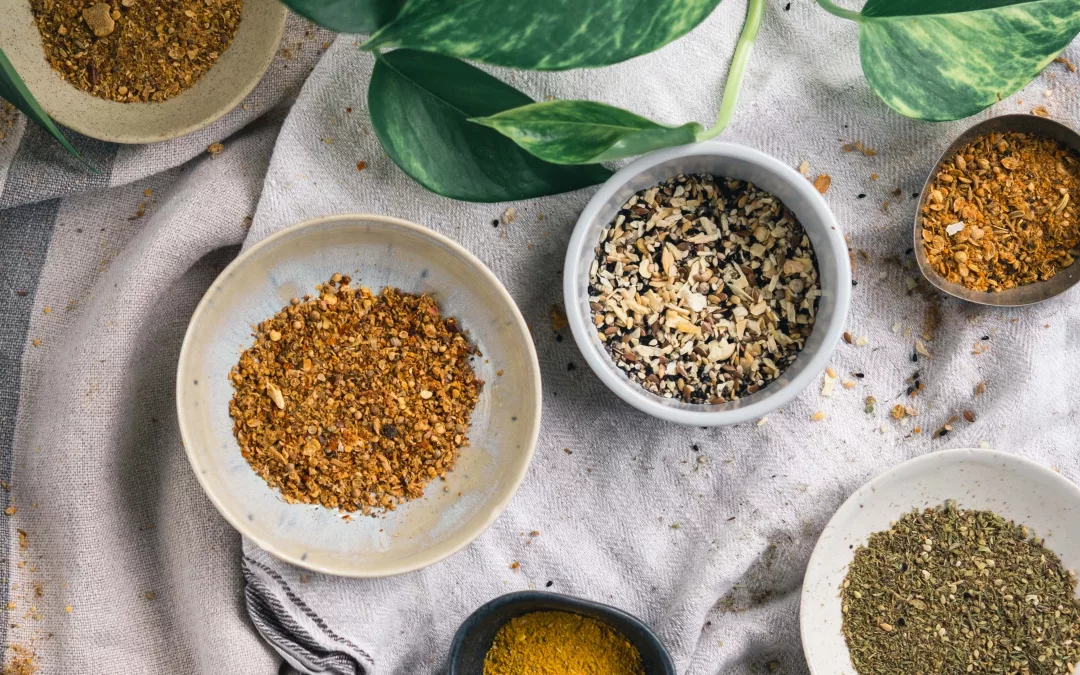Written by Kimberley Gittens, RD, MHSc on behalf of Rachel McBryan, RD.
When it comes to nutrition, many people focus their attention on macronutrients like carbohydrates, fats and protein. But, there are many other nutrients that are essential to your health including minerals. Minerals play many important roles throughout your body, from building your bones and transmitting nerve signals to balancing electrolytes and regulating your heartbeat.
A deficiency in any one of them can lead to serious health problems. This means it is important to consume a balanced diet that includes a variety of nutrient-dense foods to ensure that you are getting enough of these important nutrients.
You may be familiar with some of the common minerals such as calcium, iron and potassium. But, there are many more minerals which play an important role in health.
Phosphorous
Phosphorous is the second most abundant mineral in your body, with the average adult having approximately 750 grams of the mineral stored in their body.
This mineral plays many important roles throughout the body. It is essential for moving enzymes around your body, producing energy, regulating your blood pH and controlling gene transcription. The majority of phosphorus in your body can be found in bones and teeth, while smaller amounts are found in cell membranes as well as in our DNA and RNA.
Health Canada recommends healthy people between the ages of 9 and 18 years old consume 1,250 milligrams of phosphorus each day, while adults over the age of 18 consume 700 milligrams daily. You can find a complete list of adequate intakes on Health Canada’s website. Including phosphorus-rich foods in your diet is a great way to ensure you meet recommended intakes.

You can find phosphorous in a wide range of food products. Some phosphorus-rich foods include,
-
- Milk
- Atlantic salmon
- Mozzarella cheese
- Lentils
- Cashews
- Potatoes
- Kidney beans
- Brown rice
- Whole wheat bread
- Tomatoes
- Yogurt
You can also find phosphorous in multivitamins and individual supplements. Phosphorous found in supplements is usually in the form of salts (for example, dipotassium phosphate). However, most supplements provide less than 10% of the daily value (the recommended intake amount).
Phosphorous is also added to many foods to extend their shelf-life. You can find phosphorous additives in the ingredients list. These additives can account for 300 to 1,000 milligrams of your daily phosphorous intake.
Iron
Your body needs irons for many functions, including growth and development. Iron is essential for making hemoglobin, a protein that is responsible for moving oxygen throughout your body. Iron is also needed for making hormones, supporting connective tissues (like ligaments), neurological development and supporting muscles.
There are a few different types of iron that can be found in our diet, but the main 2 are heme iron and non-heme iron. Heme iron can only be found in animal meats such as seafood, poultry and red meats, while non-heme iron can be found in plant-based and fortified foods. Heme iron accounts for approximately 10 to 15% of iron intake in Canada and the US.
Surveys show that iron deficiency is fairly common in Canada and the US, especially among women of reproductive age and pregnant women. Although iron deficiency is fairly common, and can easily be addressed, some populations have a higher risk of developing iron deficiency than others. Populations with an increased risk include, pregnant women, people with heart failure, frequently blood donor and people with GI disorders.
Iron deficiency can eventually lead to the development of iron deficiency anemia (IDA). IDA is the most common type of anemia and occurs when there is not enough iron to make hemoglobin, a molecule that moves oxygen around your bodies. Check out my article to learn more about anemias and the impact of nutrition.

Iron can be found in a huge variety of foods, including both animal and plant-based proteins! Some of the top iron-rich foods are listed below based on the type of iron they contain.
Heme iron can be found in,
-
- Organ meats
- Canned sardines
- Oysters
- Muscles
Non-heme iron can be found in,
-
- Fortified breakfast cereal
- Enriched rice and bread
- Lentils
- Spinach
- Nuts and seeds
- Beans
Calcium
You may have been told at one point or another in your life, that calcium is important to grow up strong and healthy. It’s well known that this mineral plays an important role in building strong bones and teeth, but it plays many other important roles throughout your body. Calcium is also essential for:
-
- Blood clotting
- Sending nerve signals around your body
- Enzyme reactions
- Controlling your heartbeat

Health Canada recommends healthy adults consume between 1,000 to 1,200 mg of calcium each day to meet their body’s needs. You can find calcium in many foods, particularly dairy products and dark leafy greens. Some of the richest sources of calcium include:
-
- Plain yogurt
- Orange juice
- Mozzarella cheese
- Tofu
- Soy milk
- Pink salmon
- Breakfast cereals
- Chia seeds
- Broccoli
- Sardines
- Beans
- Kale
Optimize Your Diet with Personalized Nutrition
Ready to boost your health with personalized nutrition recommendations? Book a FREE discovery call with a Registered Dietitian to get started!
Potassium
Potassium is another mineral that plays an important role in sending nerve signals throughout your body. It is responsible for sending signals telling your muscles (including your heart) to contract. Potassium also plays a role in maintaining normal blood pressure and reducing the risk of bone loss and kidney stones.
According to Health Canada, healthy adults should aim to include 2,600 to 3,400 mg of potassium daily. Including some potassium-rich foods in your diet can help meet your needs. Some great options include:
-
- Spinach
- Potato
- Lentils
- Apricots
- Kidney beans
- Tomatoes
- Bananas
- Sweet potato
For a detailed list of the amount of potassium you can find in these foods, check out Health Link BC’s page on potassium.
Sodium
Sodium is a versatile micronutrient, that acts as both a mineral and an electrolyte. Like potassium, sodium plays a role in sending nerve signals throughout the body, contracting muscles and balancing the fluid in your body. It is also responsible for maintaining the pH balance of your body and absorbing important nutrients like glucose and amino acids (protein building blocks).
Health Canada recommends limiting your sodium intake to 1,500 to 2,300 mg per day. However, studies show that most Canadians consume more sodium than they need.

Unlike many micronutrients, sodium is not naturally found in many foods but is added to many foods during cooking and processing to add flavour or increase shelf life. Some of the top food sources of sodium include,
-
- Pizza and tomato sauces
- Cured and deli meats
- Burritos and tacos
- Savoury snacks (such as pretzels, popcorn and chips)
- Cheeses
Although sodium is an essential mineral, consuming too much in your diet can increase your risk of high blood pressure, and heart disease. You can learn more in my article on heart-healthy diets.
Selenium
Selenium is a micro-mineral, which means that your body only needs very small amounts of it. Despite only needing a small amount, selenium plays a big role in reproduction, and DNA synthesis. Additionally, it is an important part of certain proteins and enzymes. As an antioxidant, selenium helps to protect your body against damage from free radicals and infections. Check out my article on antioxidants to learn more about free radicals.
Selenium is also used in the management of some conditions such as some cancers, heart, and thyroid disease.

Health Canada recommends healthy adults consume 55 micrograms (mcg) of selenium daily to meet their needs. Some people may need more selenium in their diet, such as people on dialysis.
Although you can find small amounts of selenium in drinking water, it is not enough to meet your body’s needs. However, there are many animal and plant-based sources of the mineral for you to enjoy. Some of the top sources of selenium include:
-
- Brazil nuts
- Yellowfin tuna
- Halibut
- Ham
- Shrimp
- Chicken
- Cottage cheese
- Baked beans
- Oatmeal
- Lentils
- Spinach
- Peaches
When it comes to plant-based sources, the amount of selenium in the foods depends on the minerals found in the soil that the food is grown in. In other words, if there is a low amount of selenium in the soil a plant is grown in, the plant will contain low amounts of the mineral.
Zinc
This mineral plays important roles in your immune system, cut healing, skin health and more. Zinc is also an antioxidant and plays an important role in protecting your body from free radical damage. You can learn more about zinc’s role as an antioxidant here.
Optimize Your Diet with Personalized Nutrition
Ready to boost your health with personalized nutrition recommendations? Book a FREE discovery call with a Registered Dietitian to get started!
Health Canada recommends healthy adults consume 8-11 mg of zinc daily to meet their needs. This is easy for many Canadians to do as zinc can be found in a wide variety of foods including,
-
- Beef
- Pork chops
- Oysters.
If you’re following a plant-based diet, some great sources of zinc include:
-
- Beans
- Nuts
- Whole grains
Magnesium
Most magnesium in your body is found in your bones. Up to 50% of the magnesium stored in your body is supporting your bone structure and development. The remaining magnesium is stored in your soft tissues and blood. Magnesium plays more roles in supporting health than you might think. It is required for making DNA and proteins, balancing your blood sugar, regulating your blood pressure, sending nerve signals and transporting other minerals throughout your body.

Because of its role in transporting nutrients, having low magnesium levels can lead to a deficiency of other nutrients like calcium (hypocalcemia) or potassium (hypokalemia). Health Canada recommends adults include 310 to 420 mg of magnesium in their daily diet. For many Canadians, this isn’t a problem as magnesium is found in a wide variety of foods including:
-
- Roasted pumpkins seeds
- Chia seeds
- Almonds
- Cashews
- Soy milk
- Edamame
- Smooth peanut butter
- Kidney beans
- Bananas
- Atlantic salmon
You can also find magnesium in tap, mineral and bottled water. However, the amount of magnesium can vary between brands and water sources.
Minerals Can Interact with Medications
It’s always important to review any mineral supplements you may be taking with your doctor or dietitian. Some supplements can interact with medications and prevent them from working or causing unwanted side effects. Your doctor or dietitian will be able to provide suggestions on alternative supplements, or changes in dosage or timing of supplements, to prevent interactions.
Check out the Micronutrient Monday series to learn more about the role of vitamins in supporting our health, what happens if we do not consume enough and where to find them in foods!
Optimize Your Diet with Personalized Nutrition
Ready to boost your health with personalized nutrition recommendations? Book a FREE discovery call with a Registered Dietitian to get started!
References
Dietary Reference Intakes. (n.d.). Government of Canada. Retrieved February 23, 2022, from https://www.canada.ca/en/health-canada/services/food-nutrition/healthy-eating/dietary-reference-intakes/tables/reference-values-elements-dietary-reference-intakes-tables-2005.html
Higdon, J. (2014). Phosphorus | Linus Pauling Institute | Oregon State University. Linus Pauling Institute. https://lpi.oregonstate.edu/mic/minerals/phosphorus
Phosphorus. (n.d.). National Institutes of Health. Retrieved February 23, 2022, from https://ods.od.nih.gov/factsheets/Phosphorus-HealthProfessional/
Kimberley is a Registered Dietitian, licensed in Ontario. She helps clients across Ontario control their blood sugars and reduce their risk of chronic conditions.

